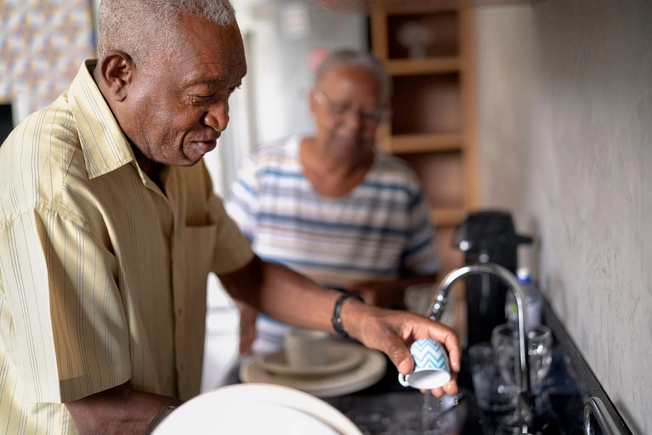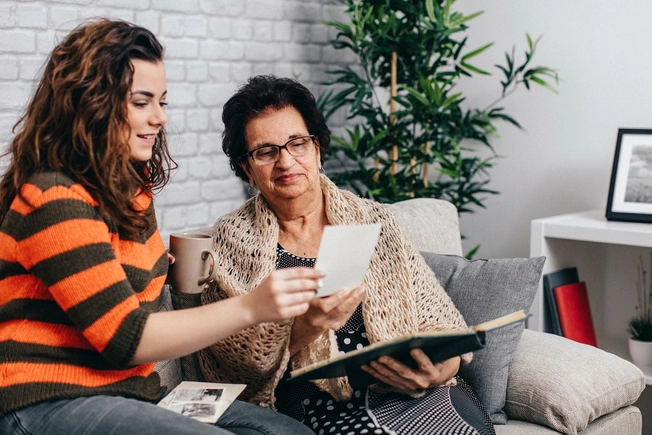- Overview
- Diagnosis & Stages
- Causes & Risks
- Treatment
- Living With
- Complications & Related Conditions
- Caregiving
- Support & Resources
- View Full Guide
Lowering Chances of Dementia Related Psychotic Behaviors


Daily Strategies
Life with dementia can be even harder for people who have dementia-related psychosis. That involves believing things that aren’t true or seeing and hearing things that others don’t. While some treatments can help alleviate the symptoms and behaviors associated with it, there are also some things you can do to make days a bit easier.

Keep a Regular Schedule
Doing things the same way at the same time each day can provide a much-needed sense of order. It can also help prevent the anxiety and the agitation uncertainty can cause. People with dementia may feel calmer and more secure if they know what the day holds and how it will unfold.

Make and Stick to a Plan
It’s easier to keep a regular schedule if you plan things out. Key parts of that include:
- Base it on the familiar.
- Be time-sensitive: As dementia progresses, people start to lose track of time. Routine can help with that.
- Keep them engaged: Ask for their help with household chores to help with both cognitive and motor skills -- and self-esteem.
Also be ready to make changes. Despite all your best efforts, dementia-related behavior isn’t predictable, so you’ll need to stay flexible.

Keep Mealtime Simple
Having meals and snacks at the same time every day is a good goal. But don’t try to force your loved one to eat. And it’s best to serve only one or two items at a time. Keep their favorite foods around as a backup. Also make sure they drink plenty of water to avoid dehydration. To keep frustration at bay, try to serve food that doesn't need time to cool off.

Steer the Conversation
Distraction can be a useful tool to curb anger or frustration, like suggesting that they turn their attention to a photo album or a favorite hobby. And phrasing things in certain ways can help prevent confusion and anxiety, too. For example, asking “Would you like to wear the red shirt?” is less likely to cause stress than “What would you like to wear today?”

Keep Days and Nights Straight
Dementia can bring “sundowning,” a state of confusion that can happen when day turns into night. Sleep habits can get off schedule, and that can lead to confusion, anxiety, and anger. Getting outside during the day and winding down before bed at night can help establish a better routine. Cutting out daytime naps along with caffeine and sugar at night can also help.

Include Regular Physical Activity
Studies show that being active is good for mental health and can ease symptoms of dementia like depression and confusion. Something as simple as taking a short walk or doing easy chair exercises for 20 minutes a day can make a big difference.

Try Music Therapy
Music can stimulate the left side of the brain, which is responsible for language and speech, and it can be a mood-booster. Singing and dancing can help ease anger, anxiety, and stress. Maybe sing along with your loved one and bring a positive vibe to daily activities.

Give Medications as Directed
If your loved one’s doctor has prescribed medicine to help with their behavior, be sure to follow all instructions carefully and keep a close eye out for any drastic changes. Keep in mind that we use medications to help ease symptoms, not to completely control behavioral issues.

Take a Short Trip
It’s good to get away sometimes, and you can do it safely with some planning. Rather than trying somewhere new, which can be disconcerting, go somewhere familiar or that holds special feelings for your loved one. That can stir pleasant memories and bring them comfort.

Make Home a Safe Place
You can do a few things to create a secure environment around the house:
- Let sunlight in during the day and try to limit shadows.
- Use carpets and cushions to soften hard surfaces and make things quieter.
- Take up any loose floor mats or rugs that can cause slips and falls.
- Paint furniture, doors, banisters, and toilet seats with bright colors that are easy to see.
- Clearly label cabinets and drawers with what’s inside.

Get Support
People with dementia and their caregivers need to know they’re not alone. It’s crucial to have an outlet to share stories and get advice from others going through the same things you are. There are plenty of groups out there, so it’s just a matter of finding the one that best meets your needs. Ask a health care professional for suggestions, or visit the Alzheimer’s Association website.